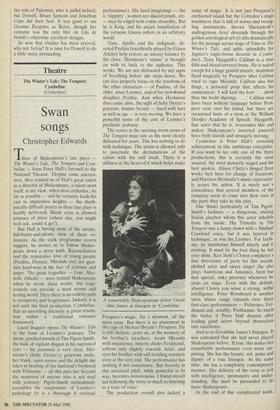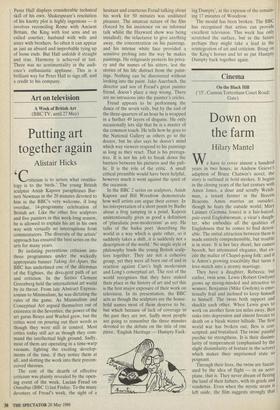Theatre
The Winter's Tale; The Tempest; Cymbeline (Cottesloe)
Swan songs
Christopher Edwards
Three of Shakespeare's late plays The Winter's Tale, The Tempest and Cym- beline — form Peter Hall's farewell to the National Theatre. Despite some uneven- ness, they remind us of Hall's great talent as a director of Shakespeare, a talent most itself, in my view, when most orthodox. As far as possible — and he certainly leads his cast to impressive heights — the rhyth- mically difficult poetry in these late plays is lucidly delivered. Blank verse is allowed primacy of place (where else, you might well ask, could it go?).
But Hall is having none of the serene, full-barns-and-plenty view of these ro- mances. As the stark programme covers suggest, he invites us to follow Shakes- peare down a stony path. Reconciliation and the restorative love of young people (Perdita. Florizel, Miranda etc) are qual- ities hard-won in the face of jealousy and anger. The great tragedies — Lear, Mac- beth, Othello — were behind Shakespeare when he wrote these works, but tragi- comedy can provide a most severe and testing world. Here there is no orderly path to prosperity and forgiveness. Indeed, it is not until the final production, Cymbeline, that an unsettling intensity is given resolu- tion within a traditional romance framework.
Lucid disquiet opens The Winter's Tale in the form of Leontes's jealousy. The mean, pinched mouth of Tim Pigott-Smith, the look of vigilant disgust in his narrowed eyes — his paranoia is very clear. Her- mione's (Sally Dexter's) generous smile, her frank, open nature and the delight she takes in hearing of her husband's boyhood with Polixenes — all this puts her beyond the suspicion of anyone who is not mad with jealousy. Pigott-Smith meticulously assembles the components of Leontes's pathology (it is a thorough if external
performance). His lurid imaginings — she is 'slippery', women are sluiced ponds, etc. — may be edged with comic absurdity. But he is King, and his unjust humiliation of the virtuous Queen ushers in an arbitrary world.
Time, Apollo and the indignant, de- voted Paulina (excellently played by Eileen Atkins) help restore an uneasy balance by the close. Hermione's 'statue' is brought on with its back to the audience. This works. We are not distracted by any signs of breathing before she steps ..down. We can also properly focus on the reactions of the other characters — of Paulina, of the older, wiser Leontes, and of her newfound daughter Perdita. And when Hermione does come alive, the sight of Sally Dexter's gracious, mature beauty — lined with hurt as well as age — is very moving. We have a powerful sense of the cost of Leontes's psychotic jealousy.
The verses in the opening storm scene of The Tempest must rate as the most clearly delivered for years. This has nothing to do with technique. The storm is allowed only to punctuate the declamations of the sailors with the odd crash. There is a stillness at the heart of it which helps make A remarkable Shakespearian debut: Geral- dine James as lnnogen in 'Cymbeline' Prospero's magic, for a moment, all the more eerie. But there is no abatement in the rage of Michael Bryant's Prospero. He is still choleric, years on, at the memory of his brother's treachery, treats Miranda with impatience, bitterly chides Ferdinand, softens only slightly towards Ariel, and eyes his brother with still bristling wariness even at the very end. The performance has nothing if not consistency. But ferocity at this sustained pitch, while powerful in its way. becomes monotonous. I found myself not following the verse so much as listening to a tone of voice.
The production overall also lacked a
sense of magic. It is not just Prospero's enchanted island but the Cottesloe's stage machinery that is full of noises and twang- ling instruments. Steven Mackintosh's androgynous Ariel descends through the golden astrological orb (it tilts dramatically for the passage across stage of Time in The Winter's Tale, and splits splendidly for Jupiter's eagle-borne descent in Cymbe- line). Tony Haygarth's Caliban is a true filth-and-blood-covered brute. He is naked except for a huge genital muzzle, doubtless fixed magically by Prospero after Caliban tried to rape Miranda. Caliban also has fangs, a personal prop that affects his enunciation: 'I will kish thy foot . . . show thee the besht shprings. . . Caliban may have been without language before Pros- pero took over his island, but there are occasional hints of a term at the William Deedes Academy of Speech. Haygarth, fine actor that he is, overcomes this and makes Shakespeare's inverted pastoral hero both slavish and strangely moving.
Cymbeline is Peter Hall's crowning achievement in this ambitious enterprise. If you want to see only one of the three productions, this is certainly the most assured, the most maturely staged and the best spoken. Alison Chitty's hinged floor works best here for change of locations, and Harrison Birtwistle's music expressive- ly scores the action. It is surely not a coincidence that several members of the company seem to come into their own in the parts they take in this play.
One thinks particularly of Tim Pigott- Smith's lachimo — a dangerous, smiling Italian playboy whom this actor inhabits from the inside. His Trinculo in The Tempest was a funny clown with a Michael Crawford voice, but it was layered in technique, as was his Leontes. For lachi- mo—he transforms himself utterly and is riveting. It must be the best thing he has ever done. Ken Stott's Cloten completes a fine threesome of parts for this accom- plished actor and sweet singer (he also plays Autolycus and Antonio). Stott has that special, risky presence whenever he steps on 'stage. Even with the doltish, absurd Cloten you sense a strong, wilful intelligence. Peter Woodward is another actor whose range expands over three first-class performances — Polixenes, Fer- dinand and, notably, Posthumus. So much the better if Peter Hall departs after leading good actors beyond themselves into excellence.
And so to Geraldine James's Innogen. It was rumoured that she had never played Shakespeare before. If true, this makes her remarkable performance even more sur- prising. She has the beauty, wit, poise and dignity of a true Innogen. At the same time, she has a completely contemporary manner. Her delivery of the verse is rich with intelligence, spontaneity and under- standing. She must be persuaded to do more Shakespeare. At the end of this complicated work, Peter Hall displays considerable technical skill of his own. Shakespeare's resolution of his knotty plot is highly ingenious — it involves reconciling Rome with Ancient Britain, the King with lost sons and an exiled courtier, husband with wife and sister with brothers. So often it can appear as just an absurd and improbable tying up of loose ends. But Hall unfolds it straight and true. Harmony is achieved at last. There was no sentimentality in the audi- ence's enthusiastic applause. This is a brilliant way for Peter Hall to sign off, and a credit to his company.



















































 Previous page
Previous page